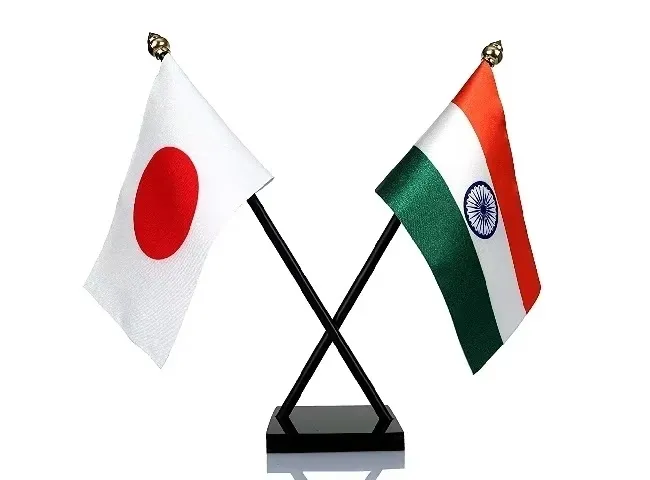How Does the India-Japan Partnership Model Strategic Diplomacy?

Synopsis
Key Takeaways
- Multi-dimensional partnership integrating economic and strategic interests.
- Focus on sustainable development and regional stability.
- Enhanced maritime security through joint exercises.
- Significant bilateral projects like the Mumbai-Ahmedabad bullet train.
- Strengthening the Quad for collective regional security.
New Delhi, Oct 9 (NationPress) The collaboration between India and Japan in the Indo-Pacific is characterized by a multi-faceted approach, blending economic cooperation, strategic interests, and sustainable development, as highlighted in a report released on Thursday.
The partnership between New Delhi and Tokyo serves as a model for strategic, profitable, and enduring diplomacy in the 21st century, according to India Narrative.
"This relationship transcends a mere alliance. It is fundamentally united by a shared commitment to a rules-based international framework, democratic values, and a mutual interest in fostering regional stability. Both nations recognize the Indo-Pacific as a zone of economic growth, technological advancement, environmental stewardship, and strategic rivalry. This partnership exemplifies how contemporary diplomacy can merge long-term development objectives with traditional security priorities," the report elaborated.
It further explained that Japan contributes advanced naval capabilities and maritime technology, while India provides strategic geographical positioning and military presence in the Indian Ocean. Both nations enhance maritime security through coordinated operations such as joint patrols and the Malabar naval exercise, aimed at ensuring freedom of navigation in crucial sea routes. The Quad, consisting of Japan, India, the US, and Australia, amplifies their collective power to counter coercion and maintain regional stability.
"The economic aspect forms the second pillar of the India-Japan partnership. India heavily depends on the Indo-Pacific for trade and energy security, making regional stability essential for economic growth. Areas like connectivity, technological innovation, and infrastructure development align with Japan's Free and Open Indo-Pacific vision and India's Act East Policy," the report stated.
"The scale of bilateral business engagement is evident in notable projects like the Mumbai–Ahmedabad bullet train and Japanese investments in Indian manufacturing sectors. To foster regional economic growth and provide a viable alternative to China's Belt and Road Initiative, both nations are collaborating on development initiatives in Southeast Asia and Africa. This doubling of investments since 2018 symbolizes the interconnection between strategic security and economic growth, which is vital for both countries and enhances regional influence," it added.
According to the report by India Narrative, the alliance with Japan enhances India's trade and energy security, creates jobs, modernizes infrastructure, and stimulates technological advancement. It also fortifies Japan’s strategic standing, opens new investment avenues, and improves regional stability, critical for its security and economic interests. The Quad presents a different collaborative model for other Indo-Pacific nations, based on sustainable development and democratic values.
"The Indo-Pacific partnership between Japan and India offers a paradigm for strategic, lucrative, and enduring diplomacy in the 21st century. A political will to enhance defense cooperation, ingenuity in creating infrastructure projects benefiting citizens, and a steadfast commitment to environmental conservation are essential for success. By harmonizing national interests with regional stability and sustainable advancement, India and Japan are setting a standard for partnerships that extend beyond mere exercises, treaties, or superficial gestures. In doing so, they are crafting a resilient, shared future for the Indo-Pacific. This comprehensive strategy demonstrates that cooperation among democracies can foster inclusive, long-term development across the region while countering emerging threats," the India Narrative report emphasized.









